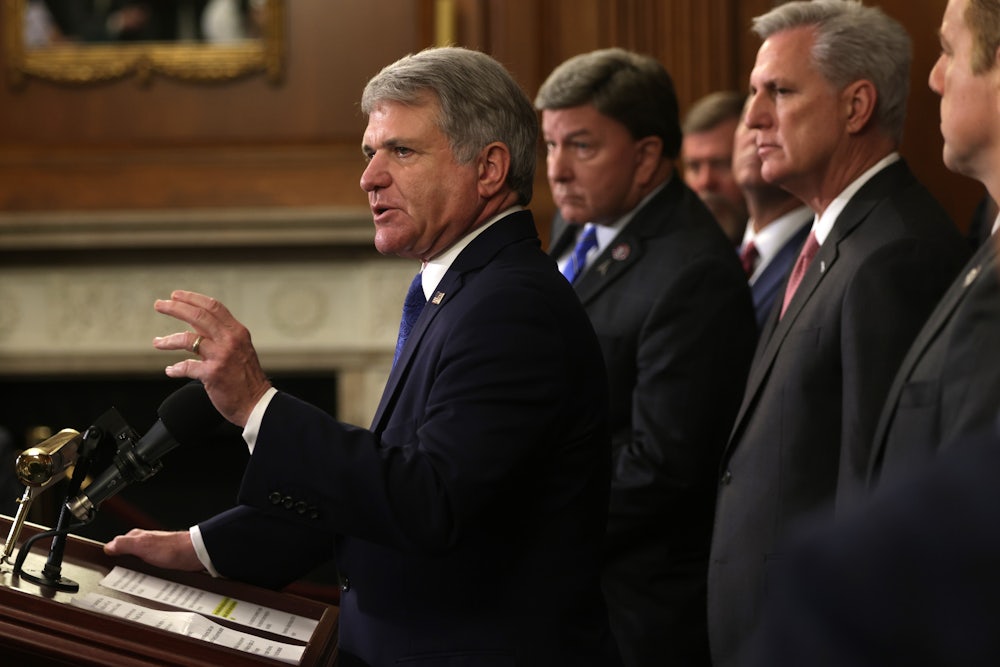House Republicans have made no secret of their desire to investigate the Biden administration and the president’s family members when they take over the chamber in January. They have promised probes of the president’s son Hunter, the administration’s border security policies, and the FBI and Department of Justice’s alleged politicization. But Republicans have also pledged to investigate the chaotic withdrawal of American troops from Afghanistan in August 2021.
“Above all, the veterans deserve answers as to what happened. Why did it go so badly? Why were Americans left behind? Why were Afghan partners we promised to protect, 100,000 of them, left to the Taliban?” Republican Representative Michael McCaul, the incoming chair of the Foreign Affairs Committee, said in a brief interview on Tuesday. “For you to make this kind of decision, for God’s sake have a plan. And what was the plan? I haven’t seen one.”
Multiple committees are expected to investigate the withdrawal, which saw the evacuation of tens of thousands of Afghans, but also included a suicide bombing attack that killed at least 170 Afghans and 13 U.S. service members and a botched U.S. drone strike that killed 10 civilians. McCaul, who sent a letter to Secretary of State Antony Blinken in October requesting the preservation of all documents related to the withdrawal, has accused the State Department, Treasury Department, and the U.S. Agency for International Development of stonewalling oversight efforts by the Special Inspector General for Afghanistan Reconstruction, or SIGAR.
In August, McCaul released a scathing report criticizing Biden’s handling of the withdrawal and alleging that hundreds of U.S. citizens had been left behind during the evacuation. The 115-page report provided a sort of blueprint for an investigation by a Republican majority committee, and identified dozens of administration officials, including Blinken, as potential witnesses in future hearings. (A memo from the White House decried the report as “riddled with false claims.”)
Representative James Comer, the incoming chair of the House Oversight Committee, has also promised a probe. In November, he sent a series of letters to several agencies claiming “illegal” obstruction of SIGAR’s work; the White House and SIGAR disagree as to the watchdog’s oversight jurisdiction.
Comer told me last week that he was particularly interested in what equipment had been left behind in Afghanistan by the U.S. military. “We don’t know who to hold accountable for the debacle in Afghanistan. We don’t know who made the decisions,” he said, adding that the committee would want to hear from Defense Department and State Department officials. “We’ve requested information. That’s our first step. We’ll evaluate the information, then determine who we need to either interview or bring before the committee.” (Comer’s primary interest as oversight chair, however, could be investigating Hunter Biden.) The House Armed Services Committee, which includes several veterans, may also investigate the withdrawal.
The Biden administration may be willing to work with the House Republican majority on the issue—provided they perceive the investigation as legitimate oversight. A spokesperson for the State Department said in a statement that the agency was “committed to working with Congress to accommodate their need for information to help them conduct oversight for their legitimate legislative purposes,” and had already provided more than 150 briefings to members and staff on Afghanistan policy since the withdrawal. “Additionally, senior department representatives have appeared in public hearings and answered questions on Afghanistan policy, and the department has responded to thousands of requests for information and letters from members and their staffs related to Afghanistan policy,” the spokesperson said.
McCaul told me that he believed some Democrats would be interested in such an investigation. “I want it to be a bipartisan exercise,” he said, although he acknowledged Democrats may not be willing to criticize Biden. “I know Democrats will defend the administration on this, but [the withdrawal] was so badly done.”
Advocates worry that the efforts to improve transparency could be clouded by partisan intentions. Rye Barcott, the CEO and co-founder of With Honor, a nonprofit organization that supports the bipartisan For Country Caucus of veteran lawmakers in the House, argued that the investigations should be bipartisan, and that veteran lawmakers should have input. “Some type of objective lens that takes the hearings out of just the political realm of trying to score points is really essential,” he told me.
Thomas Porter, executive vice president of government affairs at Iraq and Afghanistan Veterans of America, noted that “there’s plenty of blame to go around” when it comes to America’s invasion of Afghanistan; U.S. troops withdrew under Biden’s watch, but he was the fourth president to oversee the conflict. While the House investigations may be focused on simply the withdrawal, Porter said he would hoped to see a probe of two decades of conflict.
A signature concern for many veterans who served in Afghanistan is not the equipment left behind, but the people: Afghan allies who aided the U.S. military, but have been unable to obtain special immigrant visas. “We need [Congress] to not just lay blame. It’s easy to do that, and they may feel the need to do that. But if they truly want to solve problems and get to the bottom of this issue, then we need to take care of the Afghans we left behind,” Porter said.
Veterans’ organizations say there is still action that lawmakers can take this year on the issue. Porter and Barcott highlighted the Afghan Adjustment Act, legislation which would expand eligibility for special immigrant visas, establish an interagency task force to relocate and resettle allies trapped in Afghanistan, and provide a pathway to permanent legal residency for tens of thousands evacuees in the U.S. “If they want to do good, if they want to help veterans and the people that we promised our safety to, then they can not only lay blame, but they can do something about passing the Afghan Adjustment Act,” Porter said.
While the bill has bipartisan support in both chambers, several of its Republican co-sponsors in both chambers will be leaving Congress at the end of this year. McCaul, Comer, and Rogers are not among the bill’s 10 Republican co-sponsors in the House; a spokesperson for McCaul told me that he was still examining the bill. It also does not yet have sufficient Republican support in the Senate to avoid a filibuster, although a recent editorial in The Wall Street Journal endorsing the bill speaks to the potential for conservative support.
Senator Chris Coons, one of the bill’s co-sponsors in the Senate, told me that he was heartened by the Journal editorial, and said there was a “chance” it could be included in an end-of-year package of bills to fund the government. But he also alluded to some continued GOP opposition: Some Republicans believe that the vetting requirements are insufficient. “I believe that this [bill] is the best path to meet what they state as their goals, which is to ensure that every one of the more than 70,000 Afghans who we relocated here after the fall of Kabul are vetted relatively quickly and in person, those who should not be here are sorted out, and those who can and should be here are given legal status,” Coons said. “Absent passing this bill, they will be adrift for years without legal clarity.”
The bill’s supporters are pushing for its approval in the final weeks of 2022 because its passage would be an uphill climb in a divided Congress next year. Failure to do so, Barcott says, could undermine future investigations into the Afghanistan withdrawal. “I think that it will be very difficult, and frankly complicating and embarrassing, if the Afghan Adjustment Act does not pass, yet we go into a series of ongoing hearings about Afghanistan and ‘lessons learned,’” Barcott said. “Here’s one lesson to learn: Do the right thing for our Afghan allies.”






